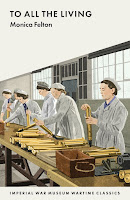Featured
- Get link
- X
- Other Apps
To All The Living by Monica Felton #Giveaway #Imperial War Museum Classics
“If poetry was the supreme literary form of the First World War then, as if in riposte, in the Second World War, the English novel came of age. This wonderful series is an exemplary reminder of that fact. Great novels were written about the Second World War and we should not forget them.’ WILLIAM BOYD
Today I am delighted to feature another in the recently released Imperial War Museum Wartime Classics Series: To All The Living by Monica Felton. I have a great giveaway for you to enter with the chance to win a print copy of the book. Details on how to enter are at the foot of this post. (UK & ROI only).
First published in 1945, To All the Living takes place in a
munitions factory throughout 1941 in Blimpton, a place ‘so far from anywhere as
to be, for all practical purposes, nowhere.’
The novel gives a lively account of the experiences of a group of men
and women in the factory from both a top down and bottom up perspective,
detailing the triumphs and tragedies of a diverse list of characters. It is wide-ranging in the themes it touches
on, including class, sexism, socialism, fear of communism, workers’ rights,
anti-semitism and xenophobia. Much of it
was based on the author’s own experiences in the Ministry of Supply in the
first years of the war, and it is one of the best depictions of factory life
during wartime, providing the reader with a fascinating insight into this vital
aspect of Britain’s home front.
Factory work, as depicted in the novel, could be exhausting and repetitive, with workers often receiving low pay. Initially work was on a voluntary basis which meant there was always a shortage of labour. As the war progressed, conscription for women was introduced in December 1941 to help stem the shortages. By 1945, 6.7 million women were contributing to the war effort out of a population of 48 million with a further 2.5 million in the voluntary sector. Only the Soviet Union mobilized a higher percentage of women for the war effort and the novel reflects the experiences of a tiny proportion of these women.
The work undertaken by women at munitions factories will also be explored in IWM’s new Second World War Galleries with personal items belonging to a worker at the Leeds based Blackburn Aircraft Factory on display for the first time when they open in October of this year.
In September 2019, to coincide with the 80th Anniversary of the outbreak of the Second World War, the IWM published the first four titles in a fiction series - the Imperial War Museum Wartime Classics. Patrol is the next in the series.
About the Author
Monica Felton (1906 – 1970) was a feminist, socialist, historian, peace activist and a pioneering proponent of town planning. She went to University College, Southampton and then did a Phd at the LSE. In 1937 she was elected a member of the London County Council representing St Pancras South West. During the Second World War she served in the Ministry of Supply, an experience she reflected in To All the Living. In 1942 she became a Clerk of the House of Commons.
After the war she became involved in town planning, serving as Chair for the Peterlee and Stevenage Development Corporations. However, she was fired from this post after taking an unauthorized trip to North Korea on behalf of the Women’s International Democratic Federation in 1951. On her return from this trip she accused American troops of atrocities and British complicity. There was a media and establishment backlash and even accusations of treason. As a result she became increasingly isolated in Britain and moved to India in 1956. She died in Madras (modern day Chennai) in 1970.
Giveaway (UK and ROI only)
- Get link
- X
- Other Apps
Comments
Popular Posts
Bear Grylls Adventures - 12 book set #Review
- Get link
- X
- Other Apps
The Perfect Match by Dandy Smith #Review
- Get link
- X
- Other Apps
The Fascination by Essie Fox #Review #Repost #Giveaway
- Get link
- X
- Other Apps











Thanks for the blog tour support x
ReplyDelete